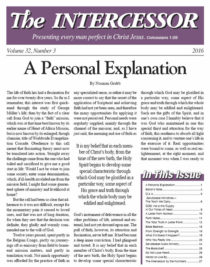
The Editor’s Note
Let us begin this issue with an analogy. Imagine a parent who has every design in hand to take care of their child one day. In fact, they have taken care of the child day after day since they were born. But the child comes to the parent every day, saying “Please, please feed me today!” Then, while the parent is preparing the food, the child continues to come back, still asking over and over again. At this point the parent is feeling annoyed. Then the child brings friends over and the friends begin begging for the parent to feed the child. The parent has never neglected to feed the child before. If this were you, you may now be feeling insulted that all these people don’t trust you enough to know that you have this need met.
We have been taught that prayer is mainly going to God to ask for what we need, right? However, many will ask Him for the same thing over and over again. Some will even elicit others to pray and ask Him for these same things on their behalf. After all, the Bible says “ask and ye shall receive.” Yes, it does. But, Jesus has more to say about this in the book of Mark. “Therefore I tell you, whatever you ask for in prayer, believe that you have received it, and it will be yours (Mark 11:24).” Notice that He says “have received,” not “will receive.” So, as in the previous analogy, why would we continue to ask God over and over for something He’s already done? This issue of The Intercessor provides examples of how to trust that God has supplied our need before we see the evidence of it. Our part is to count on it and offer up prayers of thanksgiving. For faith is the “evidence of things unseen (Heb 11:1).”
Norman Grubb starts laying the foundation for this new way of faith-prayer in our lead article, “A Personal Explanation.” He describes his God-given fascination with the life of faith and how, step by step, the road was paved for him to apply his new “method” of faith—first, in his own life, then to the problems around him. He had found that the “master key which could open a very little material door could just as easily be applied to great gateways of world-wide opportunity in the Kingdom of God.”
Next, in “Zerubbabel Ministries: The Torch We Carry,” Joanna Coatney tells how our own ministry operates by the same faith methods used by Norman Grubb. He set the example of how to use this “way of faith” in his own mission, the World-Wide Evangelization Crusade. It is a fascinating account of how his small band of missionaries simply counted on God’s provision to continue their mission, though the supply was unseen and the appearance of continuing seemed impossible. They began “launching out in faith…acting now and taking for granted the supply would come.” We are grateful to Norman for paving the way and passing this torch on to us.
Having stated our need to God, Norman says “we never repeat it again in the form of a request; we don’t ask, we thank.” But our next article has him addressing “What if it Doesn’t Happen?” So, you’ve believed and continued to thank God for the answer, but the thing you’ve believed for hasn’t come to pass. Now what? Read-on to get your answer!
In addition to our regular features, other notables for this issue include “The Total Truth in Letter Form”, a fabulous letter which is a pure, clear example of our Total Truth message. As well as a personal testimony, it is a passionate plea for a friend to break the fetters of constrained, traditional thinking and simply let God speak the Truth to the heart. Along with a personal introduction by the author’s daughter, we are excited to provide you with this gem of Truth.
You will also find a reproduction of Jackie Ginn’s pamphlet “Who you really are…and not who you thought you were.” It has been an invaluable tool for many over the years who have struggled with believing they are what they feel. It will surely help clarify the difference between your soul/feelings and your Spirit-truth.
So, in our own lives, do we seek God to supply our needs? Absolutely! But, I’ll leave you with a quote from this issue’s “Faith Notes”: “Having made the declaration once, do we repeat it? Continually, in the sense of thanking for what is coming. To go back to asking would be dishonest. If I have received by faith, I have received, and the proof of my having done so is constant thankfulness (Spontaneous You).”





